VOA标准英语2008年-Bob Kerrey, War Hero, Politician, Educator(在线收听)
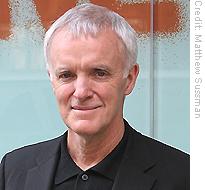 |
| Bob Kerrey has had a long and varied career as naval hero, businessman, governor, senator and now, university president |
That lack of awareness was short-lived. Soon after graduating college, Kerrey enlisted in the Navy. He was trained as an officer and inducted into the elite Navy SEALS special forces unit and sent to Vietnam. Before long, Kerrey earned the Bronze Star for combat action that would later prove controversial because it involved civilian casualties.
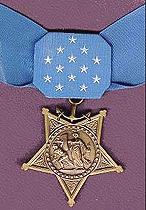 |
| Kerrey was awarded the Congressional Medal of Honor for "For conspicuous gallantry and intrepidity at the risk of his life above and beyond the call of duty" while serving as an officer in the Navy SEALS special forces unit in Vietnam |
Soon after that, he found himself in a fierce gun battle in which he single-handedly saved the men in his unit and defeated the enemy, but suffered the loss of his lower leg. Those actions earned him the Congressional Medal of Honor"…for conspicuous gallantry."
Kerrey is modest when he recalls his military service. He says he is far more proud of what he did in the hospital following his own recovery "… when I sat down with somebody who was beginning the voyage of trauma, having lost an arm or a leg or some loved one or something like that."
He asserts that someone who faces, or has faced, physical handicaps has an enhanced capacity to understand the suffering of others. "It gives you the capacity to understand people who are suffering. They may reject it. But if you're able to reach them, you can help!"
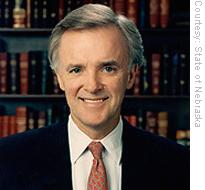 |
| Kerrey served as governor of Nebraska from 1983-1987 |
In 1982, after a decade building up a successful chain of restaurants and fitness centers in Nebraska, Kerrey decided to try his hand at politics. He ran for Nebraska state governor and was elected. He recalls that the issues he had to wrestle with, from the funding of the public schools to guaranteeing access to abortion services, were deeply meaningful, if sometimes unglamorous and unpopular.
"It takes a certain bravery to get engaged in political issues, to get involved because you are going to provoke somebody," he says. "If you want to get engaged civically and have an impact on democratic outcomes, you've got to be prepared for the controversy that comes with it."
In spite of his achievements as governor -- he balanced the budget, and saw the state through the after-effects of a calamitous tornado -- Kerrey chose to return to private life rather than seek a second term.
But his plans changed in 1987, when the senior U.S. senator from Nebraska died, and Democratic Party officials urged Kerrey to run for the seat. He did, and he won.
Kerrey is a confident man. "I have never run in a political race where my dominant worry was 'what am I going to do if I lose?'" he asserts with a chuckle. "It's the consequences of winning you've got to be prepared for!"
Kerrey often warns even seasoned lawmakers never to underestimate the enormous responsibility that comes with elective office: "There's real power in those offices," he says. "If you see someone out there that needs help, just one person, and if a letter or a phone call can get them out of those chains, do it."
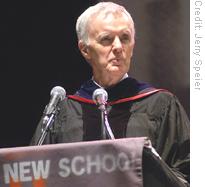 |
| Bob Kerrey gives a commencement speech as president of the New School in New York City |
In 1992, Senator Kerrey sought the Democratic Party's nomination for president, but lost to a young Arkansas governor named Bill Clinton. In 2001, Kerrey left the Senate to take the job of president of the New School in New York. Twenty-five percent of the university's students are foreign-born.
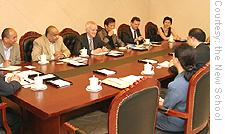 |
| Bob Kerrey at a meeting of the India China Institute at the New School. Since becoming its president in 2001, Kerrey has brought a global perspective to the university's curriculum |
Kerrey says he is excited and challenged by immigration issues and America's relationship to the world."What we're trying to do [at the New School] is simultaneously teach people about 'here' (the United States), the place, the history, the politics, the sociology, all the various things that make here 'here,' but also confront this human tendency to erect a barrier between us and the people from 'there.'"
Under Kerrey's guidance, the New School formed the India China Institute, and launched graduate programs in Global English and Global Finance. His leadership of the New School has been one more success in a remarkable life devoted to learning and public service.